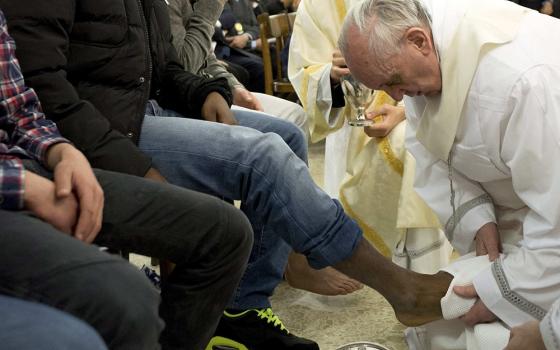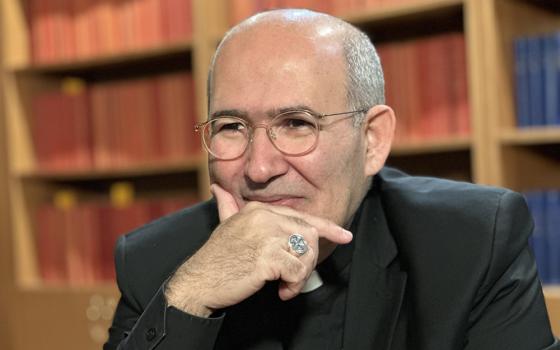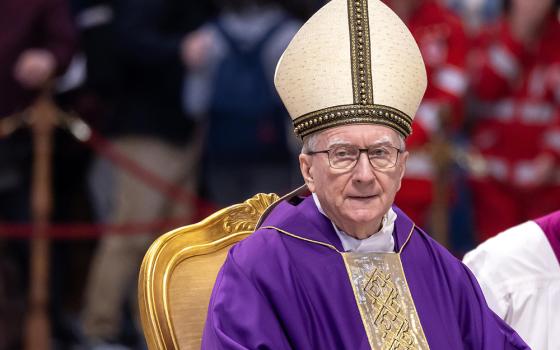A pastor from Washington urged attendees at the 2017 Los Angeles Religious Education Congress to embrace God's trust in times of political division and turmoil, such as the nation and the world currently are experiencing.
Msgr. Raymond G. East, pastor of St. Teresa of Avila Parish in the Archdiocese of Washington, spoke Feb. 25, the second day of the congress. The morning began with prayer and praise, as musicians from Catholic Relief Services and Oregon Catholic Press led the crowd in a lively morning prayer service.
Attendees were invited to think about global solidarity and embracing full trust in God, who holds the world in his hands — aptly setting the theme for Msgr. East's morning keynote.
Father Chris Bazyouros, director of the Office of Religious Education for the Archdiocese of Los Angeles, introduced the priest to the spirited morning crowd at the Anaheim Convention Center Arena. He noted that East has been part of the congress for years and this was his first keynote address at the gathering.
Wearing his signature traditional African garment, East began his talk with a warm embrace.
"The theme of embracing trust begins with an embrace," he said, giving Bazyouros a spirited hug. "This morning, we commit ourselves to the divine embrace ... embracing the embraceable God."
He introduced himself as being from a 138-year-old parish in the Washington neighborhood of Anacostia, which he described as "once the murder capital of the U.S. … but is now a place filled with hope."
As the first Catholic church east of the Anacostia River, St. Teresa of Avila is considered the mother church for the area. Today the parish is predominantly African-American.
The priest, who is African-American, also said he was bringing greetings from 1600 Pennsylvania Avenue, referring to President Donald Trump and Vice President Mike Pence.
"That's why we are here today — this congress is different from any other. We've never been in a time where we feel so divided in conflict with one another," East said. "People apart, different ideas and ideologies, expressions of faith and political realities. But today I hope that we can deal with God's politics."
Expressing this theme of a united nation, embracing God's trust in times of political division and turmoil, the lively East asked everyone to look at the image of Divine Mercy as the ultimate example of embraceable love.
"Around this image of the body of Christ, we are one body, not divided, with Jesus as our head," he said. "Do you want to know what God, what love looks like? Look at Jesus, with his arms open wide, streams of love and grace opened up for us, extended for all the world."
Sharing stories from Scripture — including about Moses, Abraham and Sarah — he talked about embracing trust in a God "who brings us from slavery to freedom, who is still in the business of liberation."
He cited Mary as the ultimate example of faithful trust in God, when she gave her yes — her fiat — in the Annunciation, singing her famous line: "Let it be done to me according to your Word."
Keeping with the theme of embracing trust in a divided world, East challenged the audience to think about minorities, immigrants and refugees in the 21st century, many who feel cast out more than ever.
"How does their plight connect with ours?" he asked the clapping and cheering crowd. "We have inherited this myth … that the Divine image does not include darker shades of color. The myth that we are not all created in God's image is dangerous and deadly. Unless we can go and see that we are all sisters and brothers, together, none of our politics will ever make sense."
East also talked about American "exceptionalism" as not God's vision of true patriotism, which he defined as loving the land, Mother Earth, and respecting her and her people.
He made the crowd laugh when he pulled out several bills from his wallet, all of which read "In God We Trust."
"If your money can trust in God, what about you?! Are you ready to put your trust and value in God?" he asked.
He finished by telling stories of his parish's mission twinning partnership with St. Antoine Church in Vieux Bourg D'Aquin, Haiti, through "Hope for Haiti" and Project Educate a Child of Haiti.
The Archdiocese of Washington and St. Teresa of Avila Parish partners with CRS, the U.S. bishops' overseas relief and development agency, and other charities to bring annual donations, volunteers, food and medical supplies to the needy in the dioceses of Haiti.
"St. Teresa of Avila said that Christ has no body, no hands, no feet on earth, but yours. … Yours are the hands God needs to feed the hungry. God is using your body, your strength, even your time and money to do his work," said East.
Inviting the audience to raise their hands in an oath of solidarity, he asked them to become "international Christians, going to the least, lost and last," and challenged them to practice corporal works of mercy, such as visiting the prisoner and welcoming the stranger.
The morning keynote moved husband and wife Trevor and Anna Rodrigues from Culver City, who are both parish volunteer missionaries through their ministry, Holy Cross Africa, at St. Monica Church in Santa Monica.
"I was very touched; the Holy Spirit had a hand in having us here today. Because (East) talked about calling all of us to be Christians internationally, and doing it intentionally," said Trevor. "I feel totally fired up with the Spirit, and this is a great word of affirmation to our ministry!"
St. Monica's Holy Cross Africa ministry, Trevor said, has sent over 250 volunteer missionaries to its sister parish, Holy Cross in Dandora, Kenya, a church in the slums of Nairobi, the capital city.
"It's really the people of Dandora, those living in the slums and in the developing world, who are examples of trusting in God," said Anna. "There is so much joy despite their living conditions. It's a beautiful blessing to go back … we do a lot, and, as Msgr. said, there is always more that God is calling us to."
This great mission call, East said, is ultimately how we express God's eternal love for us in the real world.
"We are called to be merciful like the Father, who loves immigrants and refugees, those who live in the margins, those without papers, those willing to step up to the call," East concluded. "And as we embrace, know that God is embracing us."





